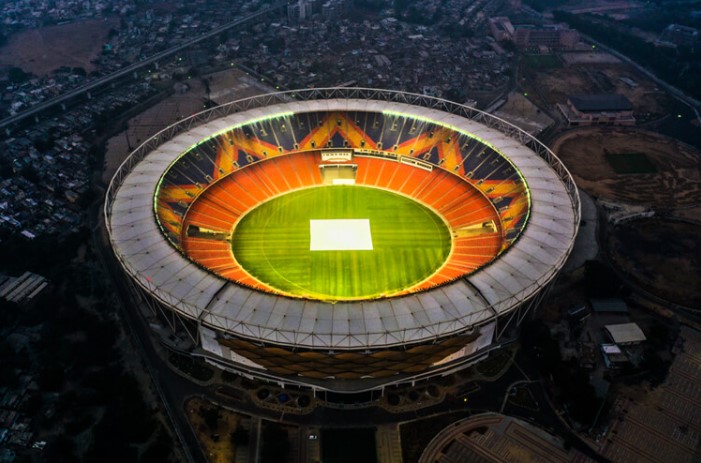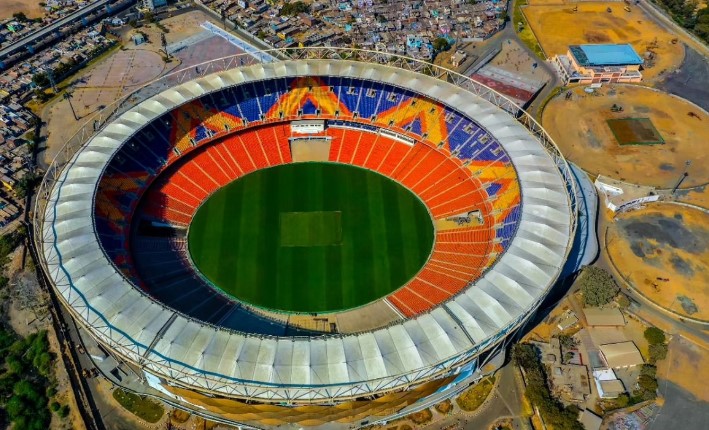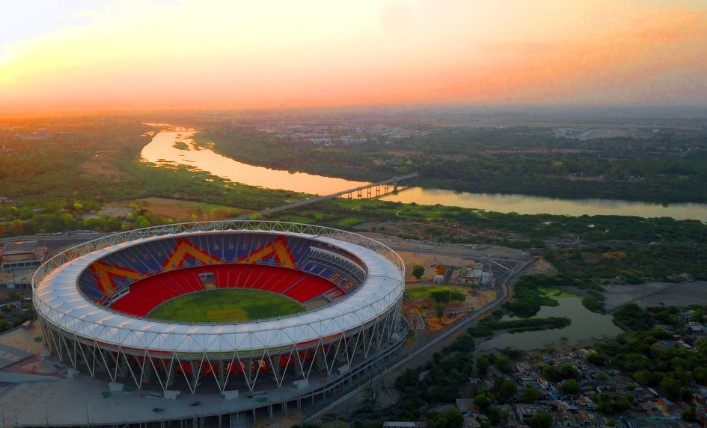Narendra Modi Stadium: Cricket is a sport that is known for its rich history and global appeal, and one of its defining characteristics is the size and layout of the playing field. The size of the cricket ground plays a critical role in determining how the game is played, influencing the strategies of both the batting and bowling sides. While most cricket grounds around the world adhere to standard regulations, there are certain grounds that stand out due to their extraordinary size.
Among the vast array of cricket grounds, the Narendra Modi Stadium, located in Ahmedabad, India, holds the title of the longest cricket ground in the world. This monumental stadium, which also boasts the largest capacity of any cricket ground globally, is not just a feat of engineering but a symbol of the ever-growing stature of cricket in India and around the world.
This article will explore the Narendra Modi Stadium, its dimensions, history, and the significance of its size in shaping the sport. We will also compare it to other large cricket grounds around the world and discuss how the size of a cricket ground impacts the dynamics of the game.
The Narendra Modi Stadium: The Longest Cricket Ground in the World

Located in Sardar Vallabhbhai Patel Sports Complex in Ahmedabad, Gujarat, India, the Narendra Modi Stadium is recognized for its massive size. Previously known as the Sardar Vallabhbhai Patel Stadium, the ground was renamed after the Prime Minister of India, Narendra Modi, following extensive renovations and expansions that were completed in 2020.
The Narendra Modi Stadium has earned its reputation not just as the largest cricket ground in terms of seating capacity but also as the longest cricket ground in the world. The stadium boasts a playing area that measures a stunning 170 meters (558 feet) in length and 150 meters (492 feet) in width. This vast expanse of grass is what sets it apart from other cricket grounds, making it the longest cricket ground ever built.
Key Details of the Narendra Modi Stadium
| Feature | Description |
|---|---|
| Name | Narendra Modi Stadium |
| Location | Ahmedabad, Gujarat, India |
| Playing Area Length | 170 meters (558 feet) |
| Playing Area Width | 150 meters (492 feet) |
| Seating Capacity | 132,000 |
| Year of Establishment | 1982 (renovated in 2020) |
| Home Team | Gujarat (State Cricket Team) |
| Major Events Hosted | India vs. England 2021 Test Match, IPL Finals, ICC Tournaments |
The sheer size of the field is a distinguishing feature, particularly in terms of how it influences the game, from batting to fielding strategies. The Narendra Modi Stadium has been designed to accommodate the highest standards of both international and domestic cricket, ensuring that it can host some of the most prestigious cricketing events in the world.
The Dimensions of the Narendra Modi Stadium
One of the most significant features of the Narendra Modi Stadium is the playing field’s length and width, both of which surpass the dimensions of most other cricket grounds. According to the Laws of Cricket, the boundary distance must not exceed 85 meters from the center of the pitch. However, the Narendra Modi Stadium exceeds these norms, with the longest straight boundaries stretching up to 170 meters, making it the longest cricket ground in the world.

While it may seem like the larger boundaries would favor the bowlers, this vast size also has its own unique impact on batting and fielding tactics. For instance, batsmen are less likely to clear the boundary without significant force, especially when playing shots on the off-side or in the deep. This naturally encourages more strategy and placement, with a focus on rotating the strike and hitting gaps in the field rather than solely aiming for big boundaries.
The stadium’s large dimensions are complemented by its massive seating capacity. With a staggering 132,000 seats, the Narendra Modi Stadium is not only the longest cricket ground but also the largest in terms of capacity. It surpassed the Melbourne Cricket Ground (MCG) in terms of seating when it was renovated and reopened in 2020.
Comparison of Largest Cricket Grounds by Dimensions
| Stadium Name | Location | Length (m) | Width (m) | Seating Capacity |
|---|---|---|---|---|
| Narendra Modi Stadium | Ahmedabad, India | 170 | 150 | 132,000 |
| Melbourne Cricket Ground (MCG) | Melbourne, Australia | 173 | 146 | 100,024 |
| Eden Gardens | Kolkata, India | 160 | 130 | 66,000 |
| Lord’s Cricket Ground | London, England | 156 | 130 | 30,000 |
| Sydney Cricket Ground (SCG) | Sydney, Australia | 156 | 130 | 48,000 |
The History and Renovation of the Narendra Modi Stadium
The Narendra Modi Stadium was originally built in 1982 as the Sardar Vallabhbhai Patel Stadium. It quickly became one of the most significant stadiums in India due to its central location in Ahmedabad and its initial capacity of around 50,000 spectators. However, with the growing popularity of cricket and the increasing demand for large-scale venues, the stadium underwent a massive renovation and expansion between 2016 and 2020.

The renovation project included not only expanding the seating capacity but also increasing the playing field’s dimensions. The layout was redesigned to cater to the evolving needs of modern cricket, with a focus on optimizing the spectator experience and improving the stadium’s facilities. The Narendra Modi Stadium officially opened in 2020 after the completion of the renovation, and its new design has allowed it to host some of the most significant events in world cricket.
One of the most notable events hosted at the stadium was the India vs. England Test Match in 2021, marking the stadium’s debut as a Test match venue after the renovation. The stadium has since been the center of various international tournaments, including the Indian Premier League (IPL) Finals and the ICC T20 World Cup 2021.
Impact of the Longest Ground on the Game
The size of the playing area at the Narendra Modi Stadium has a direct impact on the game. Here’s how its dimensions influence various aspects of cricket:
Batting Strategy
The vast boundaries of the Narendra Modi Stadium present a challenge for batsmen who are accustomed to clearing the ropes easily on smaller grounds. As a result, batsmen must focus on shot placement and running between the wickets more efficiently. The additional distance between the boundary and the pitch means that shots to the deep field are less likely to go for sixes. Batting teams are more likely to score runs by placing the ball into gaps and rotating strike, rather than relying on big hits.
Bowling Strategy
For bowlers, the long boundaries can provide a sense of relief. They can focus more on tight line and length, knowing that the field is large enough to offer ample protection against powerful boundary shots. Fast bowlers can also extract more bounce from the pitch, which can work to their advantage on larger fields. However, spinners may need to rely more on variations and flighted deliveries to induce mistakes, as batsmen may have more time to judge the ball.
Fielding Strategy
Field placements at the Narendra Modi Stadium become a key aspect of the game due to the large size of the ground. Captains and fielding coaches must carefully place fielders in both the inner and outer circles. On large grounds like the Narendra Modi Stadium, it’s crucial to have strong outfielders who can quickly cover ground and prevent boundaries. Fielders are expected to be agile, as the vast space means they are required to chase balls across long distances.

Impact of Ground Size on Batting, Bowling, and Fielding
| Aspect | Impact on Batting | Impact on Bowling | Impact on Fielding |
|---|---|---|---|
| Batting Strategy | Focus on placement and strike rotation | Less pressure to hit sixes, focus on accuracy | Fewer opportunities for easy boundaries |
| Bowling Strategy | Challenging for aggressive batting | More margin for error, focus on tight lines | Deep fielders play crucial roles |
| Fielding Strategy | Running between wickets more critical | Need for quick coverage of the field | Agile fielding required across large distances |
Future Prospects of the Narendra Modi Stadium
With its immense size and state-of-the-art facilities, the Narendra Modi Stadium is expected to continue hosting some of the most prestigious cricketing events in the future. Its status as the longest cricket ground in the world gives it a unique place in the history of cricket, ensuring that it will remain a landmark for the sport for decades to come.
The stadium’s size, both in terms of capacity and playing area, enhances the viewing experience for fans, making it one of the most sought-after venues for international cricket. Additionally, its ability to host large-scale events, such as the ICC T20 World Cup and IPL, ensures that it will remain at the forefront of global cricket for years to come.
The Narendra Modi Stadium stands as a testament to the growing scale of modern cricket. As the longest cricket ground in the world, it has changed the dynamics of how the game is played, with its vast dimensions influencing batting, bowling, and fielding strategies. Its sheer size and capacity have made it a true icon in the world of cricket, attracting fans and players alike.
In the future, the Narendra Modi Stadium will continue to be a focal point of cricketing excellence, hosting major international events and contributing to the global popularity of the sport. It is more than just a cricket ground—it’s a symbol of cricket’s grandeur and the sport’s ever-expanding reach across the world.

